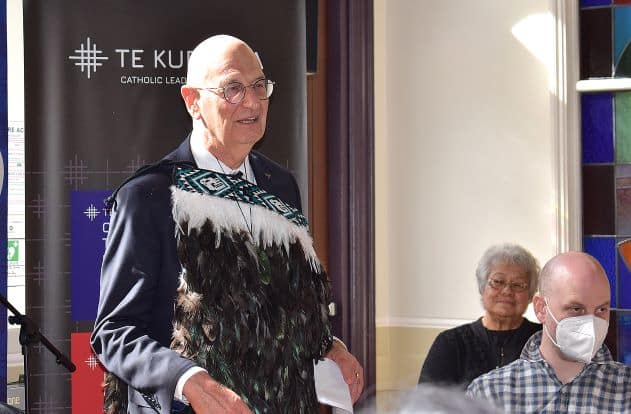The new chief executive of Te Kupenga-Catholic Leadership Institute, Robert Blucher, said he hopes to develop a culture of teamwork and collaboration within the organisation, as well as support and develop staff to become “a well-oiled organisation that is providing good service that is reaching out to everybody”.
Mr Blucher was welcomed with a mihi whakatau on September 2, at Te Kupenga-Catholic Theological College in Ponsonby. Four bishops took part. He was accompanied by his family as well as leaders and staff of the previous education provider for which he worked, Te Kura.
Wellington Coadjutor Archbishop Paul Martin, SM, who represented both the bishops and the Te Kupenga board, said that Te Kupenga “is incredibly important for us for the life of our Church and for faith”.
“While this is a position, for us, it is so much more than that. It’s about our taonga, our gift of faith. We want people to know and understand what it is we believe, why we believe, which then can lead to a deepening of faith. It’s knowledge and faith tied together,” Archbishop Martin said.
Auckland Bishop Stephen Lowe, Auckland Bishop Emeritus Patrick Dunn and Dunedin Bishop Michael Dooley were also there to welcome the new chief executive.
At a later interview with NZ Catholic, Mr Blucher said that he felt “like I’ve been called to this job”.
“My main vision is to make sure we’ve got a good vibrant organisation, and that we’re providing exceptional service to the people that it exists for,” he said.
Mr Blucher said that his impression is that there are three strong agencies within Te Kupenga, which are each working well. Now, however, they need to develop that higher organisation that serves as an umbrella for these agencies, so that they are all on the same page.
“I’ve been seen as having some skills and experience to help in the overall mission, but particularly in having Te Kupenga as one organisation, rather than three,” he said.
Te Kupenga is the home of three national agencies: the Catholic Theological College, responsible for providing approved tertiary qualifications; the National Centre for Religious Studies, responsible for supporting religious education in Catholic schools; and the Nathaniel Centre for Bioethics, responsible for research and advocacy on bioethical issues.
Mr Blucher said that he has a lot of experience in this area in his previous job as regional manager in Te Kura.
“I was involved in formulating strategy, but the large part of it was operationalising strategy [or] putting the strategy into place. And that involved change management with a large number of staff,” he said. Change management is a structured approach to implementing change within an organisation.
This provided him with “valuable experience in developing teams, working collaboratively and ensuring workloads were reasonable during major changes”.
For Te Kupenga, Mr Blucher said they would need to consider things like how to let people know that it is a Catholic organisation, how it fits in secular New Zealand, biculturalism, as well as how it responds as an organisation to the current climate crisis.
Mr Blucher pointed out that the synod response from the Church in New Zealand is a good source of feedback which can be taken into account by Te Kupenga in the next strategic planning.
Though he hasn’t worked in a Catholic system before, Mr Blucher, who is a Ponsonby-Herne Bay parishioner, said that his “faith underpins everything I do and how I conduct myself through my life and work”.
“I pray for guidance and think carefully about the best way to approach any issues, as it is . . . important to deal with the issue, but also keep everyone’s mana intact.”

Reader Interactions